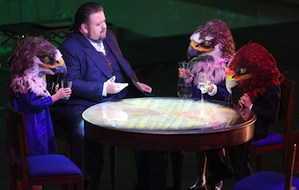
Spoiler alert: yes, Die Frau ohne Schatten (Woman Without Shadow) at the end of Richard Strauss' opera does acquire a shadow, becoming human and mortal. (But if you want to find out what happens to the evil Nurse, you have to see the opera.)
FroSch, as it's called by regular operatchniks, is making a big — if controversial — splash at the Met with the revival of the 2001 Herbert Wernicke production, but the news here is of something else.
Munich's Bavarian State Opera, destroyed in World War II, reopened in 1963 with a new production of the 1919 Die Frau ohne Schatten. Now, this week, there is a new production, an uncut version for the first time, both broadcast and telecast for free.
Kirill Petrenko, succeeding Kent Nagano as General Music Director, is making his debut in that role, directing the Bayerisches Staatsorchester in FroSch:
"The possibility of conducting Die Frau ohne Schatten hit me like a bolt from the blue. This is an absolute godsend for me! Performing this opera in this venue and continuing such an impressive tradition is absolutely awe-inspiring."
The production is by Polish director Krzysztof Warlikowski, who was inspired by Alain Resnais's 1961 film Last Year at Marienbad, in which European nobility meets during the post-War period in a fictional German spa. "The opera," says Warlikowski, "could be the story of a woman, a couple, living in a sanatorium where they are seeking an answer for themselves — this is the rich, decadent world, as it were.
"On the other side, another couple lives in the sanatorium, the down-to-earth dyers, who are responsible here for washing the laundry of the sanatorium guests. This also reminds us of Thomas Mann's Magic Mountain, of course," says Warlikowski. [A personal note from this column: I hope something in the production will remind us of Richard Strauss too.]
Adrianne Pieczonka sings the part of the Empress, Deborah Polaski is the Nurse. Johan Botha sings the role of the Emperor, Wolfgang Koch is the Barak, Elena Pankratova is the Dyer's Wife.
The premiere will be presented live via audio broadcast on BR Klassik on Nov. 21, beginning at 5 p.m. local time; the Dec. 1 performance, beginning at 6 p.m., will be streamed live on Staatsoper.TV.

